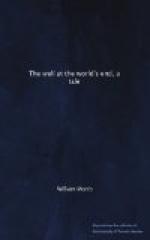“Yea,” she said; “but do not folk die there in the world behind us? I have seen sights far worser than this at Utterbol, little while as I was there. Moreover I can note that this army of dead men has not come all in one day or one year, but in a long, long while, by one and two and three; for hast thou not noted that their raiment and wargear both, is of many fashions, and some much more perished than other, long as things last in this Dry Waste? I say that men die as in the world beyond, but here we see them as they lie dead, and have lain for so long.”
He said: “I fear neither the Waste nor the dead men if thou fearest not, beloved: but I lament for these poor souls.”
“And I also,” said she; “therefore let us on, that we may come to those whose grief we may heal.”
CHAPTER 18
They Come to the Dry Tree
Presently as they rode they had before them one of the greatest of those land-waves, and they climbed it slowly, going afoot and leading their horses; but when they were but a little way from the brow they saw, over a gap thereof, something, as it were huge horns rising up into the air beyond the crest of the ridge. So they marvelled, and drew their swords, and held them still awhile, misdoubting if this were perchance some terrible monster of the waste; but whereas the thing moved not at all, they plucked up heart and fared on.
So came they to the brow and looked over it into a valley, about which on all sides went the ridge, save where it was broken down into a narrow pass on the further side, so that the said valley was like to one of those theatres of the ancient Roman Folk, whereof are some to be seen in certain lands. Neither did those desert benches lack their sitters; for all down the sides of the valley sat or lay children of men; some women, but most men-folk, of whom the more part were weaponed, and some with their drawn swords in their hands. Whatever semblance of moving was in them was when the eddying wind of the valley stirred the rags of their raiment, or the long hair of the women. But a very midmost of this dreary theatre rose up a huge and monstrous tree, whose topmost branches were even the horns which they had seen from below the hill’s brow. Leafless was that tree and lacking of twigs, and its bole upheld but some fifty of great limbs, and as they looked on it, they doubted whether it were not made by men’s hands rather than grown up out of the earth. All round about the roots of it was a pool of clear water, that cast back the image of the valley-side and the bright sky of the desert, as though it had been a mirror of burnished steel. The limbs of that tree were all behung with blazoned shields and knight’s helms, and swords, and spears, and axes, and hawberks; and it rose up into the air some hundred feet above the flat of the valley.
For a while they looked down silently on to this marvel then from both their lips at once came the cry the dry tree. Then Ralph thrust his sword back into his sheath and said: “Meseems I must needs go down amongst them; there is naught to do us harm here; for all these are dead like the others that we saw.”




